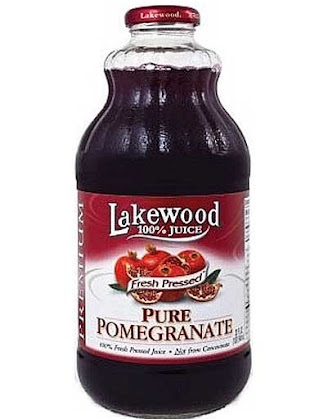The pomegranate (Punica granatum L.) fruit has been used for centuries in ancient cultures for its medicinal purposes. Pomegranate fruits are widely consumed fresh and in beverage forms as juice and wines.
Pomegranate has been extensively used as a folk medicine by many cultures. Pomegranate fruit is a rich source of two types of polyphenolic compounds: anthocyanins and hydrolyzable tannins, which account for 92% of the antioxidant activity of the whole fruit.
Pomegranate juice may slow the growth of prostate cancer. Pomegranate juice has been shown to stabilize the levels of men’s PSA, or prostate specific antigen.
Prostate cancer is the most common invasive malignancy and the second leading cause of cancer-related deaths among U.S. males.
According to UCLA study published in July 2006 issue of Clinical Cancer Research, men who drank eight ounces of pomegranate juice a day nearly quadrupled the amount of time that their PSA levels remained stable following prostate-cancer treatment.
Pomegranate juice shows potent antioxidant and anti-atherosclerotic properties attributed to its high content of polyphenols, including ellagic acid in its free and bound forms (as ellagitannins and ellagic acid glycosides), gallotannins, and anthocyanins (cyanidin, delphinidin, and pelargonidin glycosides) and other flavonoids (quercetin, kaempferol, and luteolin glycosides.
Ellagic acid and tannins have been shown to exhibit in vitro and in vivo anticarcinogenic properties, such as induction of cell cycle arrest and apoptosis, as well as the inhibition of tumor formation and growth in animals.
Medicinal Benefits of Pomegranate: A Natural Ally Against Prostate Cancer
The liquid naturally present in the tissues of fruits is known as fruit juice. To obtain fruit juice, mechanical techniques like squeezing or macerating fresh fruits are employed, excluding the use of heat or solvents. Individuals commonly drink fruit juices due to their perceived health benefits.
Friday, January 07, 2022
Medicinal Benefits of Pomegranate: A Natural Ally Against Prostate Cancer
Labels:
health benefits,
pomegranate juice,
prostate cancer
The Most Popular Posts
-
Mango juice is more than just a tropical delight—it is a powerful natural aid for digestive health. Packed with essential nutrients, mango j...
-
Fruit Juice Kiwi fruit juice is extracted from Kiwi fruit. Kiwi fruit could lower cholesterol and stress, while fighting cancer. Phenolics, ...
-
β-carotene, a precursor to vitamin A, is an essential nutrient found abundantly in fruits and vegetables, notably in watermelon. This carote...
-
Kiwi juice is a nutrient-rich beverage that provides a variety of health benefits, making it an excellent addition to a balanced diet. Rich ...
-
The Concord variety of grape, primarily used in the manufacture of grape juice, undergoes a precise, multi-step process to ensure quality an...






